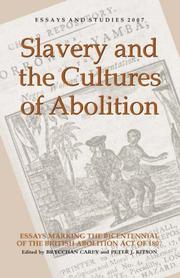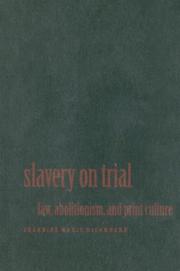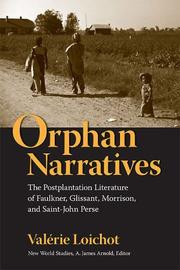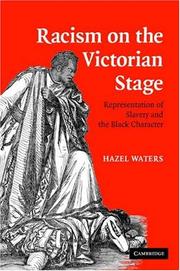| Listing 1 - 6 of 6 |
Sort by
|
Book
ISBN: 0822388839 Year: 2007 Publisher: Durham : Duke University Press,
Abstract | Keywords | Export | Availability | Bookmark
 Loading...
Loading...Choose an application
- Reference Manager
- EndNote
- RefWorks (Direct export to RefWorks)
A study of representations of the French Atlantic slave trade in the history, literature, and film of France and its former colonies in Africa and the Caribbean.
French literature --- Slavery in literature --- Slavery in motion pictures --- Slave-trade --- History and criticism

ISBN: 9781843841203 1843841207 Year: 2007 Volume: 60. Publisher: Cambridge Brewer
Abstract | Keywords | Export | Availability | Bookmark
 Loading...
Loading...Choose an application
- Reference Manager
- EndNote
- RefWorks (Direct export to RefWorks)
History of North America --- anno 1800-1899 --- United States --- Slavery --- Slavery in literature. --- Esclavage --- Esclavage dans la littérature --- History. --- Histoire --- Esclavage dans la littérature --- United States of America

ISBN: 0746309562 0746311249 1786942526 9780746309568 9781786942524 9780746311240 Year: 2007 Publisher: Liverpool Liverpool University Press
Abstract | Keywords | Export | Availability | Bookmark
 Loading...
Loading...Choose an application
- Reference Manager
- EndNote
- RefWorks (Direct export to RefWorks)
This book examines the ways in which Phillips responds both creatively and critically to the psychological effects of cultural dispersal, racism and economic exploitation. Highlighting the continuing negotiations between Britain and its previous colonies, this study demonstrates the ways in which Phillips’ fictional and non-fictional work reformulates the traumatic crises and corresponding agents of survival, both within the past and the present. It transcends the restriction of linear time to produce an intertemporal dynamic. His work is discussed not only in terms of its critical emphasis upon past events, but also its vision of a more expansive dimension of collective experience.
Blacks in literature --- Racism in literature --- Slavery in literature --- Historical fiction --- History and criticism --- Phillips, Caryl --- Criticism and interpretation --- Caribbean literature (English) --- European literature --- Black authors --- History and criticism. --- Criticism and interpretation. --- English literature --- Caribbean literature --- PHILLIPS (CARYL), 1958 --- -CRITIQUE ET INTERPRETATION

ISBN: 1469605791 0807887730 0807830860 0807858129 9780807887738 9781469605791 9780807830864 9780807858127 9798893132489 Year: 2007 Publisher: Chapel Hill
Abstract | Keywords | Export | Availability | Bookmark
 Loading...
Loading...Choose an application
- Reference Manager
- EndNote
- RefWorks (Direct export to RefWorks)
America's legal consciousness was high during the era that saw the imprisonment of abolitionist editor William Lloyd Garrison, the execution of slave revolutionary Nat Turner, and the hangings of John Brown and his Harpers Ferry co-conspirators. Jeannine Marie DeLombard examines how debates over slavery in the three decades before the Civil War employed legal language to ""try"" the case for slavery in the court of public opinion via popular print media. Discussing autobiographies by Frederick Douglass, a scandal narrative about Sojourner Truth, an abolitionist speech by Henry David Th
Slavery --- Slavery in literature. --- Law and legislation --- History --- Slavery and slaves in literature --- Slaves in literature --- Abolition of slavery --- Antislavery --- Enslavement --- Mui tsai --- Ownership of slaves --- Servitude --- Slave keeping --- Slave system --- Slaveholding --- Thralldom --- Crimes against humanity --- Serfdom --- Slaveholders --- Slaves --- Enslaved persons in literature --- Enslaved persons

ISBN: 9780813926407 9780813926414 Year: 2007 Publisher: Charlottesville, Va University of Virginia Press
Abstract | Keywords | Export | Availability | Bookmark
 Loading...
Loading...Choose an application
- Reference Manager
- EndNote
- RefWorks (Direct export to RefWorks)
American fiction --- Families in literature --- Orphans in literature --- Plantation life in literature --- Slavery in literature --- West Indian literature (French) --- French literature --- West Indian literature --- Slavery and slaves in literature --- Slaves in literature --- Family in literature --- History and criticism --- West Indian authors --- Faulkner, William, --- Glissant, Édouard, --- Morrison, Toni. --- Saint-John Perse, --- Morrison, Toni --- Faulkner, William --- Glissant, Edouard --- Saint-John Perse --- Enslaved persons in literature

ISBN: 9780521862622 0521862620 9780511486081 9780521107556 0521107555 9780511275449 0511275447 0511274742 9780511274749 0511273193 9780511273193 0511273983 9780511273988 0511486081 9786610815630 6610815631 1107168643 1280815639 0511320973 Year: 2007 Publisher: Cambridge, UK Cambridge University Press
Abstract | Keywords | Export | Availability | Bookmark
 Loading...
Loading...Choose an application
- Reference Manager
- EndNote
- RefWorks (Direct export to RefWorks)
While there are many studies of nineteenth-century race theories and scientific racism, the attitudes and stereotypes expressed in popular culture have rarely been examined, and then only for the latter half of the century. Theatre then was mass entertainment and these forgotten plays, hastily written, surviving only as hand-written manuscripts or cheap pamphlets, are a rich seam for the cultural historian. Mining them to discover how 'race' was viewed and how the stereotype of the black developed and degraded, sheds a fascinating light on the development of racism in English culture. In the process, this book helps to explain how a certain flexibility in attitudes towards skin colour, observable at the end of the eighteenth century, changed into the hardened jingoism of the late nineteenth. Concentrating on the period 1830 to 1860, its detailed excavation of some seventy plays makes it invaluable to the theatre historian and black studies scholar.
Racism and the arts --- Racism and the arts. --- Racism in popular culture --- Racism in popular culture. --- Rassismus --- Rassismus. --- Geschichte 1830-1860. --- Schwarze --- Drama --- Drama. --- Englisch. --- Race in literature. --- Schwarze (Motiv). --- Theater and society --- Theater and society. --- Theater --- Theater. --- Motiv --- History --- 1800-1899. --- Great Britain. --- Großbritannien. --- Race in literature --- Actors --- Society and theater --- Popular culture --- Arts and racism --- Arts --- Social status --- Social aspects --- Prejudices in literature. --- Racism in literature. --- Slavery in literature. --- English drama --- History and criticism. --- Slavery and slaves in literature --- Slaves in literature --- Enslaved persons in literature
| Listing 1 - 6 of 6 |
Sort by
|

 Search
Search Feedback
Feedback About UniCat
About UniCat  Help
Help News
News